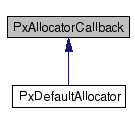
#include <PxAllocatorCallback.h>

Public Member Functions | |
| virtual | ~PxAllocatorCallback () |
| destructor | |
| virtual void * | allocate (size_t size, const char *typeName, const char *filename, int line)=0 |
| Allocates size bytes of memory, which must be 16-byte aligned. | |
| virtual void | deallocate (void *ptr)=0 |
| Frees memory previously allocated by allocate(). | |
| virtual PxAllocatorCallback::~PxAllocatorCallback | ( | ) | [inline, virtual] |
destructor
| virtual void* PxAllocatorCallback::allocate | ( | size_t | size, | |
| const char * | typeName, | |||
| const char * | filename, | |||
| int | line | |||
| ) | [pure virtual] |
Allocates size bytes of memory, which must be 16-byte aligned.
This method should never return NULL. If you run out of memory, then you should terminate the app or take some other appropriate action.
Threading: This function should be thread safe as it can be called in the context of the user thread and physics processing thread(s).
| size | Number of bytes to allocate. | |
| typeName | Name of the datatype that is being allocated | |
| filename | The source file which allocated the memory | |
| line | The source line which allocated the memory |
Implemented in PxDefaultAllocator.
| virtual void PxAllocatorCallback::deallocate | ( | void * | ptr | ) | [pure virtual] |
Frees memory previously allocated by allocate().
Threading: This function should be thread safe as it can be called in the context of the user thread and physics processing thread(s).
| ptr | Memory to free. |
Implemented in PxDefaultAllocator.